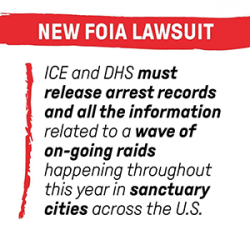We're suing ICE and DHS for information on terror tactics used in arrests
[caption align="right"] [/caption]
[/caption]
On Wednesday, we joined with the Immigrant Defense Project (IDP) to file a Freedom of Information Act (FOIA) lawsuit against the Department of Homeland Security (DHS) and Immigration and Customs Enforcement (ICE) to demand access to arrest records and related information for a wave of ICE raids in sanctuary cities across the U.S. this year.
The lawsuit seeks to compel both ICE and DHS to release policy guidances, memos, and trainings as well as records regarding the process ICE uses to determine “targets” pertaining to “Operation Palladium,” an aggressive immigration surveillance and policing initiative that advocates say has dramatically increased the use of force and other aggressive tactics by ICE since it began in early 2020. ICE and DHS refused to release information on the program in response to an urgent FOIA request, filed in June 2020, over concerns about the program. The lawsuit filed Wednesday seeks a court order to immediately release the requested documents.
“Since this administration came to power almost four years ago, they have made it a priority to attack and try to destroy immigrant communities,” said IDP Interim Executive Director Mizue Aizeki. “‘Operation Palladium’ is clearly another bullying tactic by the federal government against cities like New York due to policies that protect immigrants.”
Learn more about this filing on our website.
On the blog: ICE Policing Through the Pandemic
In the latest on our blog, the Immigrant Defense Project and the Center for Constitutional Rights write about “Operation Palladium,” an aggressive immigration enforcement program that is part of a Trump administration effort to target sanctuary cities, which have enacted measures to protect immigrant residents and prevent federal immigration enforcement practices from disrupting state and local systems and services. Operation Palladium has been described by The New York Times as a “supercharged arrest operation.”
The blog post reads:
Palladium is the culmination of the Trump administration’s escalating attacks on immigrants and sanctuary cities. Soon after Trump took office, his administration released “Executive Order: Enhancing Public Safety in the Interior of the United States,“ identifying as “threats” immigrants and cities and states with policies seeking to disrupt the police-to-deportation pipeline, including those with detainer policies that limit police collaboration with ICE. Throughout the last four years, the administration has proceeded to engage in a series of actions to undermine these policies, including efforts to limit federal funding, an exponential increase in ICE arrest operations at courthouses — including a 1700% increase in such operations in NY, and an ongoing PR campaign equating immigrants and the cities that aim to protect their rights as threats to public safety. …
Continue reading on our website.
"The Activist Files" Podcast: Colonialism on Trial - Bolivian Indigenous Resistance
[caption align="right"] [/caption]
[/caption]
On Episode 33 of The Activist Files, Rutgers Law School Distinguished Professor of Law Beth Stephens and University Network for Human Rights Supervisor in Human Rights Practice Thomas Becker, both Center for Constitutional Rights cooperating attorneys, speak with Senior Legal Worker Leah Todd about Mamani v. Sánchez de Lozada and Sánchez Berzaín, a case against the former Bolivian president and minister of defense for their role in the use of deadly military force, largely in Indigenous Aymara communities, during 2003 popular protests. Beth and Thomas share updates on victories in the case since the district court judge overruled the jury's unanimous verdict in favor of our clients, and discuss how it emerged from Indigenous community-led organizing in Bolivia and continues to model how people's lawyering can be guided by social movements. They also situate the case in the context of Bolivia's 2019 coup and historic 2020 election, and the five century-plus history of Indigenous resistance to colonization in the Americas.
Listen to the episode on our website.

